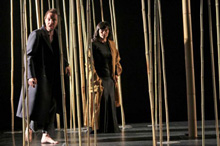Brook reduces Mozart to bare essentials
>44867.
 © By MIKE SILVERMAN, For The Associated Press – 8 juillet 11. NEW YORK (AP) — On a list of operas in dire need of a radically stripped-down reimagining, « The Magic Flute » doesn’t rank especially high. Mozart’s next-to-last stage work, a mixture of fairy tale and Masonic morality play, is a miraculous creation whose music has a sublime simplicity. Even a lavish production in a large opera house can conjure up a childlike sense of wonder. Yet this is the project the esteemed director Peter Brook chose as his farewell to his longtime home, the Theatre des Bouffes du Nord in Paris. And now it has now been imported to New York, where it opened the 2011 Lincoln Center Festival on Wednesday night.
© By MIKE SILVERMAN, For The Associated Press – 8 juillet 11. NEW YORK (AP) — On a list of operas in dire need of a radically stripped-down reimagining, « The Magic Flute » doesn’t rank especially high. Mozart’s next-to-last stage work, a mixture of fairy tale and Masonic morality play, is a miraculous creation whose music has a sublime simplicity. Even a lavish production in a large opera house can conjure up a childlike sense of wonder. Yet this is the project the esteemed director Peter Brook chose as his farewell to his longtime home, the Theatre des Bouffes du Nord in Paris. And now it has now been imported to New York, where it opened the 2011 Lincoln Center Festival on Wednesday night.
Brook, who performed similar streamlining on Bizet’s « Carmen » and Debussy’s « Pelleas et Melisande » and is perhaps best known as the director of the non-operatic « Marat/Sade, » calls his production « A Magic Flute, » in acknowledgment that it is not quite the opera Mozart wrote.
Seven barefoot young singers, dressed in plain costumes by Helene Patarot and accompanied only by piano, perform a version that’s been condensed by about a third, to an hour and 40 minutes with no intermission. There is no chorus and the stage is empty except for a few props — bamboo poles, a trunk on wheels, some colorful pieces of fabric. Philippe Vialatte’s delicate lighting contributes to the changing moods.
« Ours is a light, effervescent ‘Flute,' » Brook writes in a program note, « where an intimacy with the performers allows the tenderness and the depth of the score to appear. »
Seen in preview at the cozy Gerald Lynch Theater at John Jay College, this « Flute » is indeed light, frequently effervescent, rarely less than charming and sometimes quite moving. But perhaps as much is lost as gained by the experiment. For example, the small-scale intimacy works brilliantly in such moments as the duet in which the heroine Pamina and the clownish bird catcher Papageno discuss the joys of matrimony. Seated on the floor together in a space defined by the bamboo poles, they converse in the understated, seemingly spontaneous manner that characterizes most of the singing.
But later, when Pamina contemplates suicide, thinking she has lost the love of the hero Tamino, the scene comes up short. As Mozart wrote it, three genies (usually sung by boy sopranos) come to her rescue, and their four voices blend in heart-stopping harmony. But here there are no boys, just a stage actor who takes Pamina’s dagger away and leads her to Tamino.
Part of the problem may be the singer cast in the role of Pamina. In her first professional stage role, Jeanne Zaepffel displays a sweet sliver of a soprano voice but not much animation. On the other hand, there’s personality to spare in the irresistible Papageno of baritone Thomas Dolie. His rubbery face and wry comic timing make his scenes a delight, and he sings with full-throated warmth. At one point, he even darts into the audience to seek out the female companion for whom he longs. Vocally, the most imposing cast member is bass Luc Bertin-Hugault, who imbues the role of the high priest Sarastro with regal bearing and sings with velvety smoothness and considerable power. Soprano Malia Bendi-Merad copes admirably with the fearsome coloratura of the Queen of the Night’s two arias, though her high F is more hinted at than sung. Tenor Adrian Strooper sings with a pleasing tone as Tamino. Tenor Raphael Bremard makes the villainous Monostatos much less a caricature than usual, and soprano Dima Bawab is a charming, light-voiced Papagena, the bird catcher’s soul mate.
Franck Krawcyzk, one of Brook’s co-adaptors on the project, plays the piano with verve and keeps the singers mostly on track.
One jarring touch is the insertion of a Mozart song not from the opera for Papagena to sing on her first appearance. It beefs up an otherwise tiny role but otherwise serves no good purpose. The use of some of Mozart’s piano writings in the accompaniments is amusing but similarly gratuitous.
This « Flute, » sung in German with dialogue in French and subtitles in English, is playing through July 17. Alternate casts will appear at some performances.
http://www.newstimes.com/
0 thoughts on “Brook reduces Mozart to bare essentials”